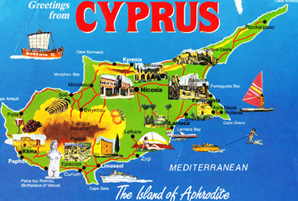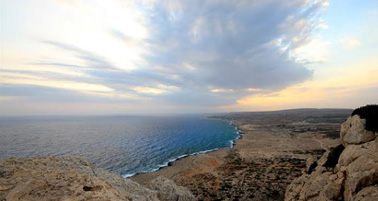AboutCyprus

The history of Cyprus is one of the oldest recorded in the world and its historical significance is disproportionate...
The Island of Cyprus situated in the east Mediterranean sea and is the third largest and third most populous island countries in the Mediterranean. Nicosia is the capital of Cyprus and also one of the main business centers of the Island. Cyprus is divided into two parts the republic of Cyprus in the south and the Turkish republic of North Cyprus. Greek and Turkish other languages used in south and north respectively. Being located at the cross roads of the continents of Africa, Asia and Europe the island has a rich history of all these cultures. Cyprus is a member of European Union and English is widely spoken and is also taught in schools as a second language.
It is also believed that it was here in Cyprus the Goddess of Love Aphrodite was born. This Aphrodite's island has a climate that is blessed with sunshine year round and very mild winters. The sandy beach cost lines covering an area of almost 650 Km boasts 53 blue flag beaches and holds three records for being the most blue flags per capita in the world, the most dense concentration of blue flag beaches and the most blue flag beaches per cost line length in the world. This along with the mountain ranges of Troodos in the middle has made this island one of the most popular tourist destination of the world.
The Island has many modern towns and cities many archeological sites that has many treasures and ruins dating a 1000 years, forts, churches and lot of other recreations.
Limassol is the main port and is also famous for wine industry. The city also has many archeological sites, Museums, and other places of historical importance. Larnaca is a city on the east cost of Cyprus and also houses the Larnaca International Airport. This is also a friendly tourist spot famous for its old churches and mosques. Paphos is situeated on the south western cost and is a place with a famous historical background. It is also the place where Aphrodite was born and UNESCO world heritage site. Aiya Napa and Protaras the most loved by those who wish to spend a summer specially on the beaches and also party capital of the meditaraninan.

CLIMATE AND WEATHER
With hot dry summers and very mild winters that are separated by short autumn and spring seasonthe island of Cyprus enjoys a typical Mediterranean climate. The summer months starts from May and lasts until September. During these months the temperature rise high with clear cloudless skies and the hottest months come in July and August. The summer leads into a very pleasant autumn and then the winter months that are cut short by a cool spring season. The average temperature during the summer reaches 29 degrees on the central plains and 22 degrees on the high ranges in Troodos. In January ,the coolest month the average temperature falls to 10 degrees on the plains and coasts and 3 degrees on the mountains.
When compared to other parts of Europe ,Cyprus enjoys a year round sunshine. It receives an average 11.5 hours of sunshine during summer and almost 5.5 hours of sunshine during the coolest months especially during December and January. Snowfalls are very rare on the plains and the coastal regions. However from December to March snow falls on the mountain slopes of Troodos where the elevations are more than 1000 meters above sea level offering ideal conditions for skiing. Fog is not very thick and can be seen in the early hours of the day and they don't hinder the visibility. During the spring season dusty waves from the African and Arabian deserts makes the atmosphere very hazy.
Clothing requirements vary according to the period of visit to Cyprus. Light summer clothing is just enough during the warmest months from June to August. The rest summer months of April, May, September and October experiences days that are warm but the temperature drops at night and therefore summer apparels, long sleeve tops or light jackets are recommended. Occasional rains occur during winter months of December and January and winter clothing is a must but a heavy coat or a jacket is not needed. Winter clothes would be appropriate during February and March when the days are fairly warm and experiences a moderate climate.
